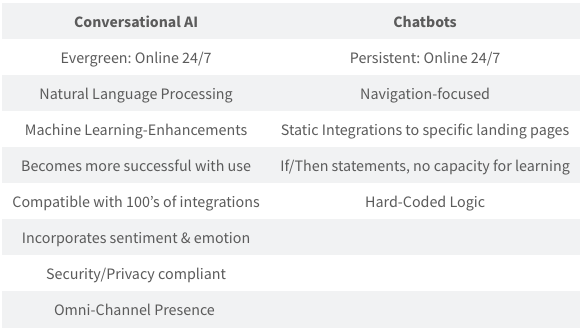It’s a madhouse.
At least that’s what you think when you look at the various systems you need to find information in your enterprise.
It wasn’t supposed to be this complicated.
You probably wonder what kind of software would be functional enough for your enterprise—without needing too many systems?
After some research, you come across options such as conversational AI and conversational chat.
And so you’re faced with a dilemma.
Conversational AI vs. Conversational chat. Which one should you choose?
The reality is that Conversational AI is an emerging market.
On the other hand, the adoption of conversational chat is widespread among B2B companies but hasn’t reached its peak.
So what’s the difference between Conversational AI and Conversational chat?
Are they the same?
To answer that question, it’s essential to define what both terms mean.
Curious?
Let’s jump in.
What is Conversational AI?
Conversational AI is, in simple terms, the synthetic brainpower that facilitates machine capability to understand, process, and respond to human language.
This advanced communication software learns to improve interactions and decide when to forward things to a human responder.
The critical component of conversational AI is its use of natural language understanding (NLU).
Using sophisticated deep learning and natural language understanding (NLU), conversational AI can elevate user experience into something truly transformational.
Intriguing, isn’t it? Let’s now understand what conversation chat is.
Conversational Chat—What is it?
Conversational chat mostly refers to chatbots.
Chatbots are the predecessors to modern Conversational AI.
Chatbots usually follow tightly scripted, keyword-based conversations.
So what does this mean?
They’re usually not useful for conversations that require them to understand what customers are saying intelligently.
Chatbots are primarily natural language text interfaces that are constructed using rules that encourage canned, linear-driven interactions.
They are typically easy to build and navigated by predefined flows.
The result?
They may be unable to understand the context of human language.
Difference between Conversational AI and Chatbots
So what’s the short version?
Conversational AI uses semantics, Natural Language Programming (NLP), and machine learning to find products, information, locate the right content and automate tasks.

Why Conversational AI Wins
Conversational AI generally overcomes the 2 main weaknesses of conversational chat.
So what are they?
1. Specific Rigidity of The Learning Models.
As previously pointed out, chatbots usually consist of canned, linear interactions based on pre-determined conversation flows.
Chatbots require specific input and have very little wiggle room for understanding the context of a conversation.
2. Chatbots can’t learn.
Chatbots have specifically designed conversation flows and don’t utilize previous conversations to establish contextual information.
Every interaction with a chatbot will seem more or less the same. This is because the chatbot will not have grown, developed, or learned in between conversations.
6 Benefits of Conversational AI —Some May Surprise You!
#1. Improve employee satisfaction
Conversational AI can have enterprise-wide benefits that impact employees as a whole.
AI-powered virtual agents can automatically complete routine and basic tasks. This allows employees to focus on more strategic and meaningful work.
Conversational AI is also helpful in employee education.
Enterprises can therefore use virtual agents in skills transfer to employees on handling various tasks, including customer support.
Moreover, AI-powered virtual agents can share sales lead recommendations with employees. This can assist employees in achieving their sales targets better.
#2. Cost efficiency
Conversational AI presents an opportunity for cost efficiency to many enterprises.
For example, staffing a customer service division can be very expensive, especially in the context of 24/7 support.
Using conversational AI can therefore decrease business costs both in terms of cost of compensation and time spent.
#3. Scalability
Conversational AI is less expensive and saves time recruiting and onboarding processes for new sales representatives. In addition, this feature makes it very scalable and suitable for enterprise expansion or periods of high consumer demand such as holiday seasons.
#4. Timely
Conversational AI can provide quick solutions to user queries probably faster than a human would.
This is because the AI element allows the software to quickly understand the context of the query and bring together all the necessary data required to respond to the user’s query.
Pretty awesome isn’t it?
it‘s good news for enterprises looking to enhance efficiency in their various teams.
#5. Superior customer service
Conversational AI certainly provides better customer service compared to chatbots.
Conversational AI is more likely to understand the context of the question and may even go a step further to provide various alternatives to the user’s query.
The result?
A positive customer experience.
#6. Customer Service Agent efficiency
Conversational AI can offer complete customer assistance without any human intervention.
For example, this may apply to routine tasks such as checking an account balance or giving a retail store location.
This means that customer service reps have more time to assist customers with more complex queries and focus on strategic objectives.
Where Can Conversational AI be used?
This is a critical question for all enterprises.
Enterprises can use Conversational AI in 3 main areas:
Services & Support (customer support, customer care):
Conversational AI can support enterprise chatbots and enhance their capability even further. Online chatbots have replaced human agents alongside the customer journey. They respond to frequently asked questions (FAQs) and are usually available 24/7.
Enhanced bots then have natural language understanding (NLU)capabilities which help handle more complex queries from customers.
Commerce:
Conversational AI is also used to support commerce when used in search assistants.
Search assistants help users quickly find products or specific information through product finders and digital assistants.
Product configurators are also helpful in ecommerce.
They help users put together specific products as they desire. Users can identify and customize these products to their liking.
Conversational AI is also used to support site search. Site search involves using a search engine to find what the user is looking for by matching their search terms with your store’s products.
Chat:
Conversational AI is also used to support chat functions across channels like Facebook, Instagram, WhatsApp, and websites.
This can support an enterprises’ customer engagement efforts
It’s now clear that conversational AI can be a source of competitive advantage to an enterprise.
So why is this the case?
Essentially Conversational AI offers digital labor.
Digital labor is the term for work processes, typically done by humans, taken over by robotic automation software.
When digital labor is used within an enterprise search engine (intranet) it can help automate tasks and speed up the “finding” process. For example, an intelligent search bar can retrieve information, forms, contracts, and other tasks to make internal search faster.
Depending on the size of the enterprise, leveraging an AI Chat enriched with semantic data and an intelligent search bar can speed up information retrieval, help identify gaps or frequently asked questions (FAQs) within the organization.
Digital labor, therefore, makes an enterprise more efficient in general.
Conversational AI for the Win
Every enterprise desires to have a competitive advantage.
Conversational AI gives your enterprise a competitive advantage as it has powerful capabilities.
Partner with Zoovu and experience conversational AI at its best.
Embrace AI-Powered software today.

